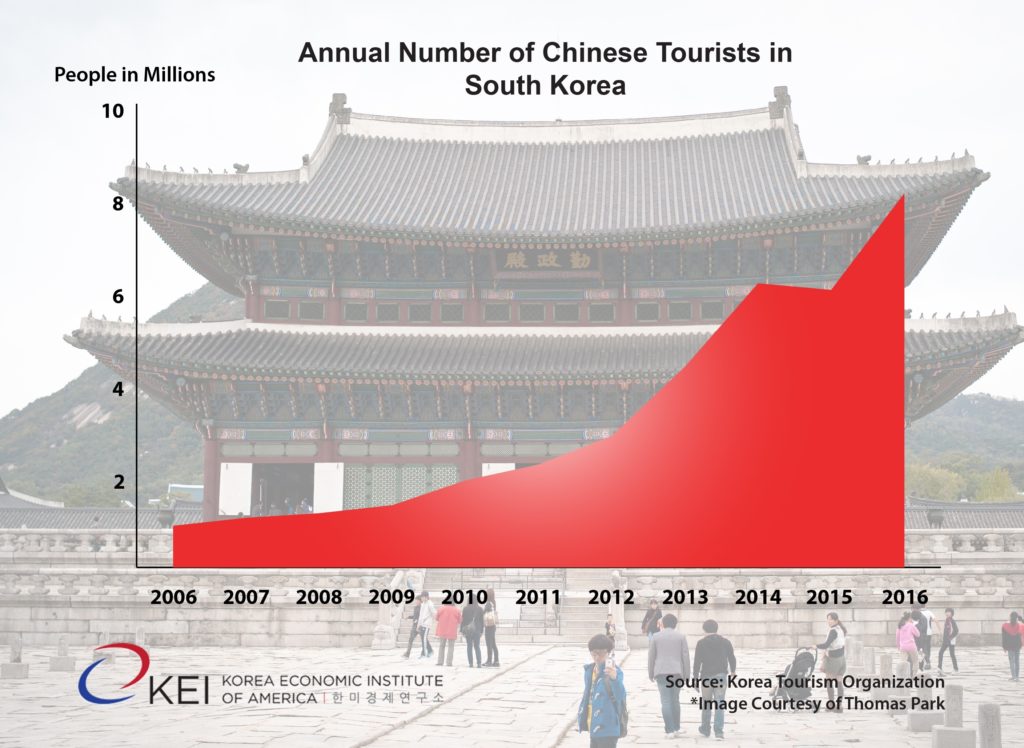The Peninsula
China’s One-Two Punch: Beijing Targets Korean Tourism and Soaps to Protest THAAD Deployment

By Jenna Gibson
After nearly nine months of suspicion and speculation about Chinese economic retaliation for South Korea’s decision to deploy THAAD, it seems Beijing has finally taken its gloves off.
First, major Chinese streaming sites announced they would no longer add popular Korean content to their pages. Then, just a few days after Korean conglomerate Lotte finalized a land-swap deal to provide one of its golf courses to host the missile defense system, Lotte’s Chinese website was hacked. Now, authorities have told Chinese travel agencies to stop selling trips to South Korea.
Nearly half of tourists to Korea are from China – meaning that with its latest move Beijing is really hitting Seoul where it hurts.
A record number of Chinese tourists entered South Korea in 2016, even in the months following the original THAAD announcement last July — according to the Financial Times, the number of Chinese tourists visiting Korea increased by 27 percent year-on-year in the four months after the announcement.
But the effects of this new block from Beijing can already be seen – a spring reward trip for 4,000 employees of a Chinese company was cancelled suddenly after the announcement, according to the Incheon Tourism Organization.
Tour packages, especially large-scale trips offered by Chinese companies as a reward for successful employees, have become very popular in recent years, and have directly contributed to the boost in Chinese tourism to Korea.
Under this ban, however, all Chinese tour agencies, even those selling individual tickets, would be prohibited from selling trips to Korea.
If carried out, this could be a huge blow not only to companies directly related to the hospitality industry, but also to retail. According to the Korea Herald, 70 percent of sales at Korean duty-free shops last year came from Chinese tourists – a remarkable 8.6 trillion won ($7.4 billion). Data from the Korea Tourism Organization indicates that Chinese tourists spent an average of $2,391 per person while visiting Korea – meaning the 8 million Chinese tourists who visited Korea in 2016 brought nearly $20 billion into the local economy.
This comes at a particularly tough time for the restaurant industry, which has seen declining sales after the new Kim Young-ran anti-corruption law capped the amount someone could spend on a gift meal for government workers, teachers, and journalists at 30,000 won ($27). According to restaurateurs, the law, which went into effect in September 2016, caused a 25 percent drop in sales.
Stocks of tourism-related companies fell following Beijing’s announcement, with cosmetics companies, retailers, automakers and airlines bearing the brunt of the drop. According to VOA, Hyundai Motor stock finished down 4.4 percent after photos of a vandalized Hyundai car went viral on Chinese social media.
But Chinese opposition to THAAD may not tell the whole story. It’s clear that THAAD influenced the decision to restrict travel to Korea, block streaming of k-dramas, and attack Lotte, coming as it does on the back of the land-swap agreement. But China may also be trying to kill two birds with one stone here.
It’s no secret that Beijing has been frustrated about the explosive popularity of Korean dramas in China. In 2014, the Chinese People’s Political Consultative Conference, a political advisory body, decried the popularity of smash hit drama “My Love from the Star,” with one member saying “It is more than just a Korean soap opera. It hurts our cultural dignity.”
And in March 2016, the Chinese Ministry of Public Security posted a warning on Weibo saying that “watching Korean dramas could be dangerous, and may even lead to legal troubles,” including domestic violence, divorce, and plastic surgery.
In addition, Korean tourism has recently been under fire in China for reasons unrelated to politics. In early 2016, news reports revealed that because of intense competition, many Korean travel agencies catering to Chinese visitors were cutting corners, providing cheap accommodations and cutting deals with shop owners to get a cut of whatever their customers bought. This resulted in tour packages that included up to six shopping mall visits in just two days.
At the time, a Chinese paper published a story titled “Korean tourism Ends up Being Pathetic,” saying in one case that a Korean travel guide wouldn’t let the tour bus leave a shopping center because the passengers didn’t spend enough money. And, according to the Financial Times, “The Chinese government last year [2016] informed South Korean tour agencies of plans to cut tourism from China by 20 per cent and limit shopping days on tours, diplomats briefed on the matter have said.”
The Korean government has since cracked down on these companies, revoking dozens of licenses and investigating complaints from tourists. But the experience, and Beijing’s response to it, may have driven Chinese travelers more toward domestic tour companies – which are now prohibited from selling trips to Korea.
With the THAAD spat, Beijing may be taking advantage of an opportunity they have long waited for – the chance to finally remove that pesky Hallyu from the picture. Whether Chinese fans of Korean shows and products go along with the plan remains to be seen.
Jenna Gibson is the Director of Communications at the Korea Economic Institute of America. The views expressed here are the author’s alone.
Photo from InterContinental Hong Kong’s photostream on flickr Creative Commons.

